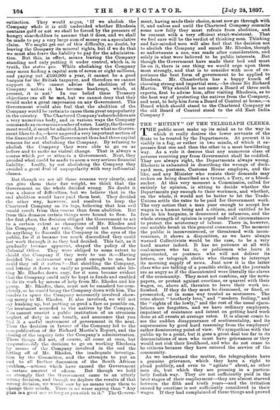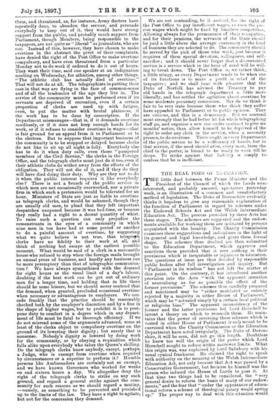THE " MUTINY " OF THE TELEGRAPH CLERKS.
THE public must make up its mind as to the way in which it really desires the lower servants of the State to be treated by the Departments. At present it is visibly in a fog, or rather in two minds, of which it ex- presses first one and then the other in a most bewildering way. As a rule it desires that any numerous class of persons receiving pay from Government shall be coddled. They are always right, the Departments always wrong. Rhetoric is exhausted in describing the wrongs of dock- yard men, postmen, Customs House employOs, and the like, and any Minister who resists their demands may reckon on being described as a tyrant, a Tory, or a blood- sucker. At this very moment a Commission, called for entirely by opinion, is sitting to decide whether the Departments pay enough to their workmen, and whether, on the whole, it would not be better to let the Trade- -Unions settle the rates to be paid for Government work. The very notion that a man poor enough to accept low wages is a human being and a citizen, and entitled to be free in his bargains, is denounced as infamous, and the whole strength of opinion is urged under all circumstances to protect the aristocracy of labour. There is, however, one notable break in this general consensus. The moment the public is inconvenienced, or threatened with incon- venience, it shows a disposition, as we have always warned Collectivists would be the case, to be a very hard master indeed. It has no patience at all with coal-miners who tax it, or policemen who leave it unprotected, or postmen who will not deliver its letters, or telegraph clerks who threaten to interrupt its morning supply of news. Just now it is the latter class who are talking of a possible strike, and the journals are as angry as if the discontented were literally the slaves of the community. They must not combine, say the news- papers, or protest against overtime, or quarrel with their wages, or, above all, threaten to leave their work un- finished. If they do they must be dismissed, or fined, or prosecuted, or in some way treated as mutineers. The cries about "brotherly love," and "modern feeling," and the "rights of the lowly," and the rest of the usual ejacu- lations are forgotten, and we have ordinary employers, impatient of resistance and intent on getting hard work done at all events at average rates. It is almost comic to see the sudden disappearance of sentimentality, and its supersession by good hard reasoning from the employers' rather domineering point of view. We sympathise with the public up to a point, but it goes a great deal too far in its denunciations of men who must have grievances or they would not risk their livelihood, and who do not cease to be citizens because they have entered the service of the community. As we understand the matter, the telegraphists have a genuine grievance, which they have a right to plead publicly, and even to " agitate " about, as other men do, but which they are pressing in a particu- larly foolish way. They are not sufficiently paid in the later stages of their employment—they are almost starved between the fifth and tenth years—and the irritation caused by overtime is not sufficiently considered in their wages. If they had complained of these things and proved them, and threatened, as, for instance, Army doctors have repeatedly done, to abandon the service, and persuade everybody to keep out of it, they would have strong support from the public, and probably much support from Parliament, though Members, being responsible to the taxpayers, are not quite so " liberal "as journalists, who are not. Instead of this, however, they have chosen to make overtime in the abstract the pivot of their complaints, have denied the right of the Post Office to make overtime compulsory, and have even threatened from a particular Monday not to do work if ordered to do it out of hours. They want their time, said one speaker at an indignation meeting on Wednesday, for athletics, among other things. " The athletic club has actually died of overtime." That will not do at all. The telegraphists in putting their case in that way are flying in the face of common-sense and of all the tendencies of the age they live in. The service of the community must be performed even if its servants are deprived of recreation, even if a certain proportion of clerks are used up with fatigue, even, to put the matter with brutal plainness, if the work has to be done by conscription. If the Department mismanages—that is, if it demands overtime needlessly, or if it does not keep enough hands for its work, or if it refuses to consider overtime in wages—that is fair ground for an appeal from it to Parliament or to the electors. But to suppose that important business of the community is to be stopped or delayed because clerks do not like to sit up all night is folly. Everybody else has to do it when duty calls, even those "pampered members of the Civil Service," the clerks in the Foreign Office, and the telegraph clerks must just do it too, even if their athletic clubs do wither away from the effects of the obligation. They will not die of it, and if they do they will have died doing their duty. Why are they not to do it when the public interest requires it like everybody else ? There is not a branch of the public service in which men are not occasionally overworked, nor a private firm in which such a pretension would be tolerated for an hour. Ministers of State are just as liable to overtime as telegraph clerks, and would be ashamed, though they are usually old men, to plead that they left important despatches unopened because it was bed-time, or because they really had a right to a decent quantity of whist. To raise such a question can only prejudice the remonstrants in the eyes of a community in which nine men in ten have had at some period or another to do a painful amount of overtime, by suggesting what we quite believe is not true, that telegraph clerks have no fidelity to their work at all, and think of nothing but escape at the earliest possible moment. What would be said of a clerk in a mercantile house who refused to stop when the foreign mails brought an unusal press of business, and hardly any business can be more peremptory than that of telegraphic communica- tion? We have always sympathised with the demand for eight hours as the usual limit of a day's labour, doubting if the best work can be got out of ordinary men for a longer time, and holding that in life there should be some leisure, but we should never contend that the demand, when granted, precluded occasional overtime when necessary or advantageous to employers. We con- cede frankly that the practice should be reasonably checked both by the employer's discretion and by a fine in the shape of higher wages, but to prohibit it is to post- pone duty to comfort in a degree which in any depart- ment of life must be fatal to thorough efficiency. If we do not misread some of the arguments advanced, some at least of the clerks object to compulsory overtime on the ground of its lowering their dignity; but surely that is nonsense. Nobody's dignity is lowered by doing work for the community, or by obeying a requisition which falls alike upon everybody who takes the Queen's shilling. Do the telegraph clerks know anybody, except, perhaps, a Judge, who is exempt from overtime when required by circumstances or a superior to perform it ? Humble persons like Ambassadors are certainly not so exempt, and we have known Governors who worked for weeks on end sixteen hours a day. We altogether deny the right of the telegraph clerks to strike on any such ground, and regard a general strike against the com- munity for such reasons as we should regard a mutiny, —namely, as something to be prevented and punished up to the limits of the law. They have a right to agitate, but not for the concession they demand. We are not contending, be it noticed, for the right of' the Post Office to pay insufficient wages, or even the pre- cise wages which might be fixed by limitless competition. Allowing always for the permanence of their occupation, and for their pensions, the servants of the State should be paid a little above the average customary in the kind of business they are selected to do. The community should be served by the pick of those who work, just because it requires of them special devotion, willingness, and self- sacrifice ; and it should never forget that a discontented service is a service which in the hour of need will be will- ing to break down. The Post Office is, we rather think, a little stingy, as every Department tends to be when one of its functions is to make a profit in relief of the taxpayers ; and we shall hear with pleasure that the Duke of Norfolk has advised the Treasury to pay old hands in the telegraph department a little more liberally, and has settled the agitation about overtime by some moderate pecuniary concession. Nor do we think it fair to be very irate because those who think they suffer have appealed to Parliament or to public opinion. They are citizens, and this is a democracy. But we contend most strongly that he had better let his whole telegraphing staff go, and organise a new one under contract to give sin months' notice, than allow himself to be deprived of the right to order any clerk in the service, when a necessity. presses, to do overtime. There ought in every Department. of the public service to be a etifficiency of hands, but in that service, if the need should arise, every man, from the chief to the porter, is bound to be ready to work till he drops. To strike against that liability is simply to. confess that he is inefficient.



































 Previous page
Previous page